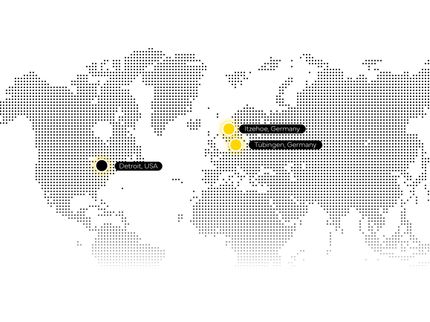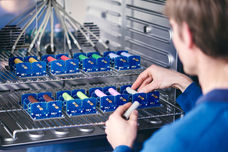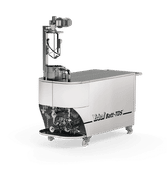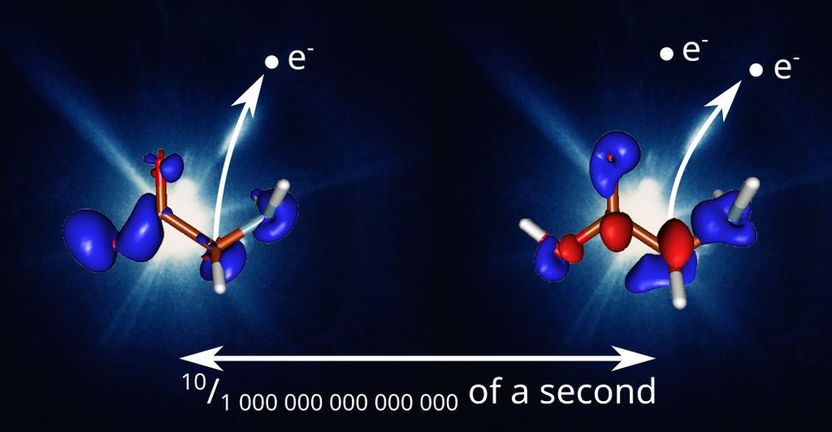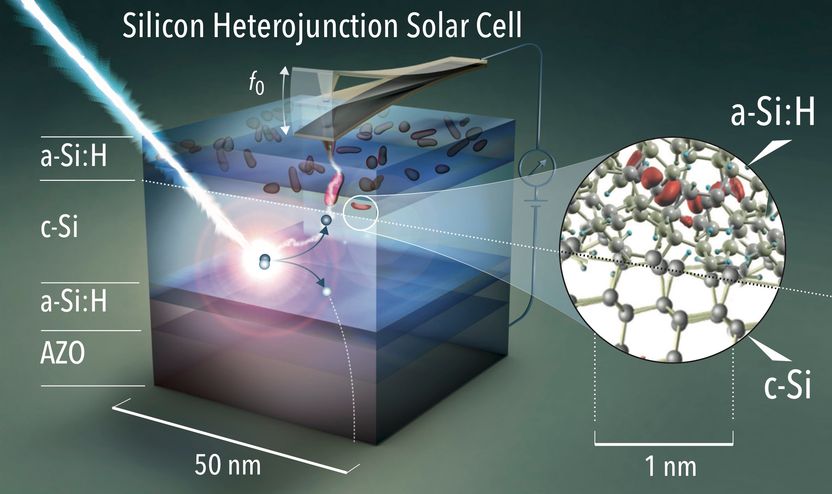Battery recycling: 70 percent of lithium recovered
Inexpensive and environmentally compatible mechanochemical recycling process developed
Recover up to 70 percent of lithium from battery waste without the need for corrosive chemicals, high temperatures, or prior sorting of materials: This is made possible by a recycling method developed at the Karlsruhe Institute of Technology (KIT) that combines mechanical processes and chemical reactions. The method allows cost-effective, energy-efficient, and environmentally compatible recycling of a wide variety of lithium-ion batteries. The researchers report in the journal Nature Communications Chemistry.
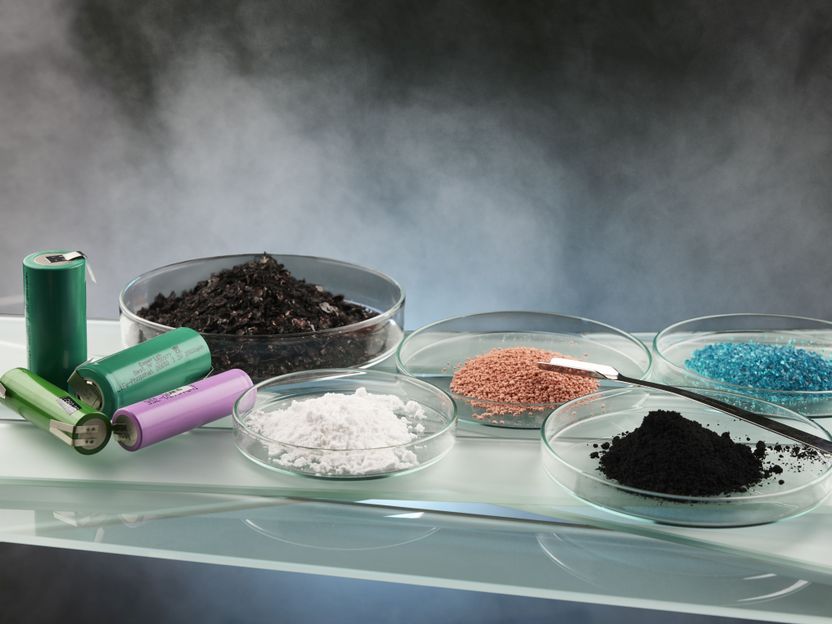
The more batteries are produced for recycling, the more important sustainable recycling processes become for the recyclables they contain.
Amadeus Bramsiepe, KIT
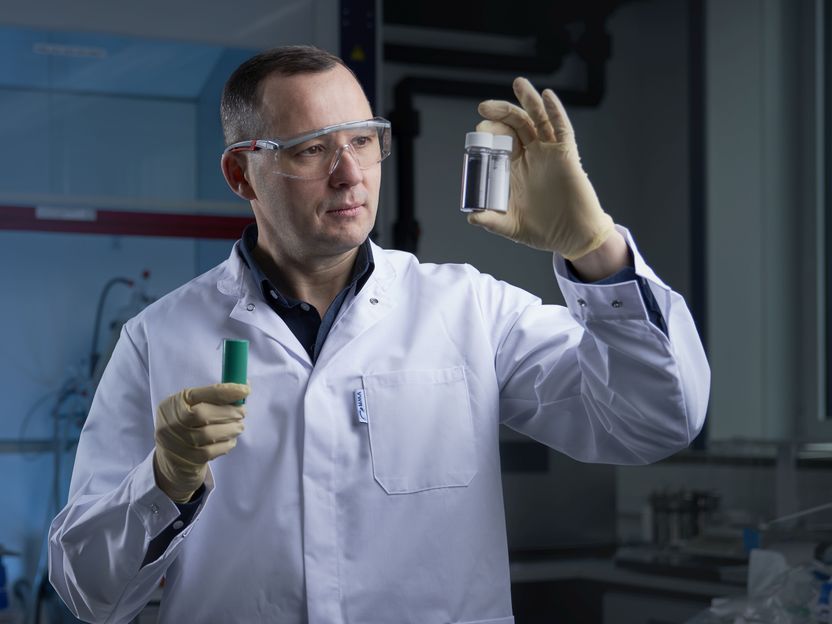
Dr. Oleksandr Dolotko, lead author of the publication, conducts research at the IAM-ESS Institute and HIU.
Amadeus Bramsiepe, KIT
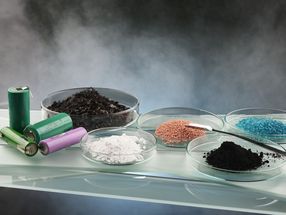
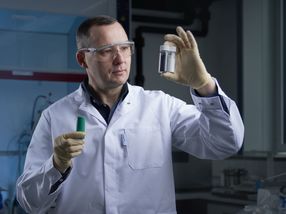
Lithium-ion batteries permeate our everyday lives: not only do they wirelessly power notebooks and smartphones, toys, remote controls and other small devices, but they also act as the most important energy storage device for rapidly growing electromobility. The increasing use of these batteries requires economically and ecologically sustainable methods for recycling. Today, mainly nickel and cobalt, copper and aluminum, and steel are recovered and recycled from battery waste. The recovery of lithium is currently still expensive and not very profitable. The available, mostly metallurgical processes consume a lot of energy and/or leave behind harmful byproducts. In contrast, mechanochemistry approaches that use mechanical processes to induce chemical reactions promise higher yields at lower cost, as well as greater sustainability.
Suitable for different cathode materials
Such a process has now been developed by the Institute for Applied Materials - Energy Storage Systems (IAM-ESS) of KIT together with the Helmholtz Institute Ulm for Electrochemical Energy Storage (HIU) founded by KIT in cooperation with the University of Ulm and EnBW Energie Baden-Württemberg AG. The researchers present their method in the journal Nature Communications Chemistry. They use it to achieve a recovery rate of up to 70 percent for the lithium without the need for corrosive chemicals, high temperatures or prior sorting of the materials. "The method is suitable for recovering lithium from cathode materials of different chemical compositions and thus for many different commercially available lithium-ion batteries," explains Dr. Oleksandr Dolotko of KIT's IAM-ESS and HIU, lead author of the publication. "It allows for cost-effective, energy-efficient and environmentally friendly recycling."
Reaction takes place at room temperature
For their process, the researchers use aluminum as a reducing agent in the mechanochemical reaction. Since aluminum is already contained in the cathode, the process does not require any additional added substances. Here's how it works: The battery waste is first ground up. Then they are used in a reaction with aluminum to produce metallic composites with water-soluble lithium compounds. The lithium is then recovered by dissolving the water-soluble compounds in water and then heating them to remove the water by evaporation. Because the mechanochemical reaction takes place at ambient temperature and pressure, the process is particularly energy efficient. Another advantage is the simplicity of the process, which will facilitate its use on an industrial scale. After all, large quantities of batteries will be produced for recycling in the near future.
Note: This article has been translated using a computer system without human intervention. LUMITOS offers these automatic translations to present a wider range of current news. Since this article has been translated with automatic translation, it is possible that it contains errors in vocabulary, syntax or grammar. The original article in German can be found here.
Original publication
Other news from the department science
These products might interest you
Most read news
More news from our other portals
See the theme worlds for related content
Topic World Battery Technology
The topic world Battery Technology combines relevant knowledge in a unique way. Here you will find everything about suppliers and their products, webinars, white papers, catalogs and brochures.

Topic World Battery Technology
The topic world Battery Technology combines relevant knowledge in a unique way. Here you will find everything about suppliers and their products, webinars, white papers, catalogs and brochures.
